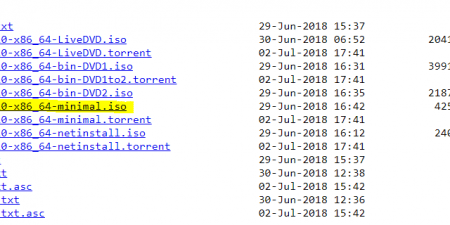Centos Iso Download For Virtualbox
| Reported by: | Owned by: | ||
|---|---|---|---|
| Component: | installer | Version: | VirtualBox 4.0.4 |
| Keywords: | Cc: | ||
| Guest type: | Linux | Host type: | Windows |
Description
Attachments
- Here, our downloaded CentOS 7 ISO file will be used as a virtual CD-ROM by VirtualBox and this is where it can be booted or started from. To do this, click on the small folder symbol and navigate the file browser to your downloaded CentOS 7 Minimal ISO file, and then click on the Start button.
- Click on the NetInstall-ISO and wait for it to download. Once this is downloaded, we can close our web browser window and start up VirtualBox. And, we're gonna make a clone of our CentOS 7 VM.
- VBox.log (63.5 KB) - added by MSkiles288 years ago.
- VirtualBox Log File
- Centos5.6_Error_4_16_11.jpg (157.7 KB) - added by MSkiles288 years ago.
- Centos 5.6 VM Specs
Change History

To install CentOS, we need to download and connect the CentOS ISO image file to the virtual CD/DVD drive of the VirtualBox Virtual Machine and make sure that the system chooses that CD/DVD drive at boot time.
Changed 8 years ago by MSkiles28
- attachmentVBox.log added
Changed 8 years ago by MSkiles28
- attachmentCentos5.6_Error_4_16_11.jpg added
comment:1 Changed 8 years ago by frank
- Status changed from new to closed
- Resolution set to fixed
Reading the Virtualbox user manual, I finally got [here], which explains how to install Virtualbox Guest Additions on a Linux guest via Command Line.
But it's not clear enough for me (I just started learning some commands). Can someone put down the exact commands you would use to install Virtualbox Guest Additions via CLI? (which includes finding where virtualbox guest additions has been mounted etc.)

8 Answers
... finally this worked for me, should also work for anybody else trying to install VirtualBox Guest Additions on a CentOS (x86_64) virtual server in command line mode.
When the process is complete, reboot the system. That's all.
@its_me's answer almost worked, but it failed building some kernel modules.
If it doesn't work for you, look at the messages.
In my case, one of them asked to look into /var/log/vboxadd-install.log. There it said something about missing kernel sources and to provide the kernel source directory with e.g. KERN_DIR=/path/to/kernel/sources.
Since kernel-devel and sources at /usr/src/kernels/2.6.32-504.16.2.el6.x86_64 were already installed, I was confused, but called it with the requested environment variable
Now it complained about missing header files and suggested to do
As you can see, this is a slightly different version, 504.16.2 vs just 504. After installing the proper kernel-devel package, building and then installing worked as expected.
So, running kernel and installed kernel sources (aka kernel-devel) must match. You can verify this by looking at the running kernel with
and the installed sources at
As a final conclusion, whatever happens, look at the messages and log files provided.
This is an old thread but came up in my search for a similar issue. In case anyone else runs into this, the following answer solved it for me:
Note* The URL says 2010 but the article was updated in 2013.
I'm posting an updated answer, as because I needed to perform a few additional steps to install. I'm using VirtualBox 5.0.14r105127. Each command will have to be prepended with 'sudo'.
Also, I got a 'FAILED' message for the OpenGL support module, but this can be ignored on a server system.
After installing the VBOXADDITIONS you might need to do this:
because the screen resolution did not work for me until I applied this final configuration to VirtualBox.
If you are using Vagrant for scripting your VirtualBox, you can simply install the vb-guest plugin. The source code for the same can be found here https://github.com/dotless-de/vagrant-vbguest/tree/master/lib/vagrant-vbguest.
Some hints can be gleamed from the source code here to automate this process.
Step 1:
Linux Centos Iso Download
yum update
Step 2:
Go to Device-> Install Guest Additions CD Image -> Next
Then provide the root password . That's it.

Just a little detail ... I had a CentOS 6.6 minimal, did all the 'yum update' and 'yum install' but I was still stuck until I've read this in Olaf's response
... this is a slightly different version, 504.16.2 vs just 504. After installing the proper kernel-devel package, building and then installing worked as expected.
So, running kernel and installed kernel sources (aka kernel-devel) must match.
checking on my install I had the same problem, after doing a reboot, everything was ok. The machine was still running with the old kernel.After this the next problem as that perl was missing so I had to do also an
protected by Community♦Aug 3 '16 at 14:59
Centos On Virtualbox On Windows
Thank you for your interest in this question. Because it has attracted low-quality or spam answers that had to be removed, posting an answer now requires 10 reputation on this site (the association bonus does not count).
Would you like to answer one of these unanswered questions instead?